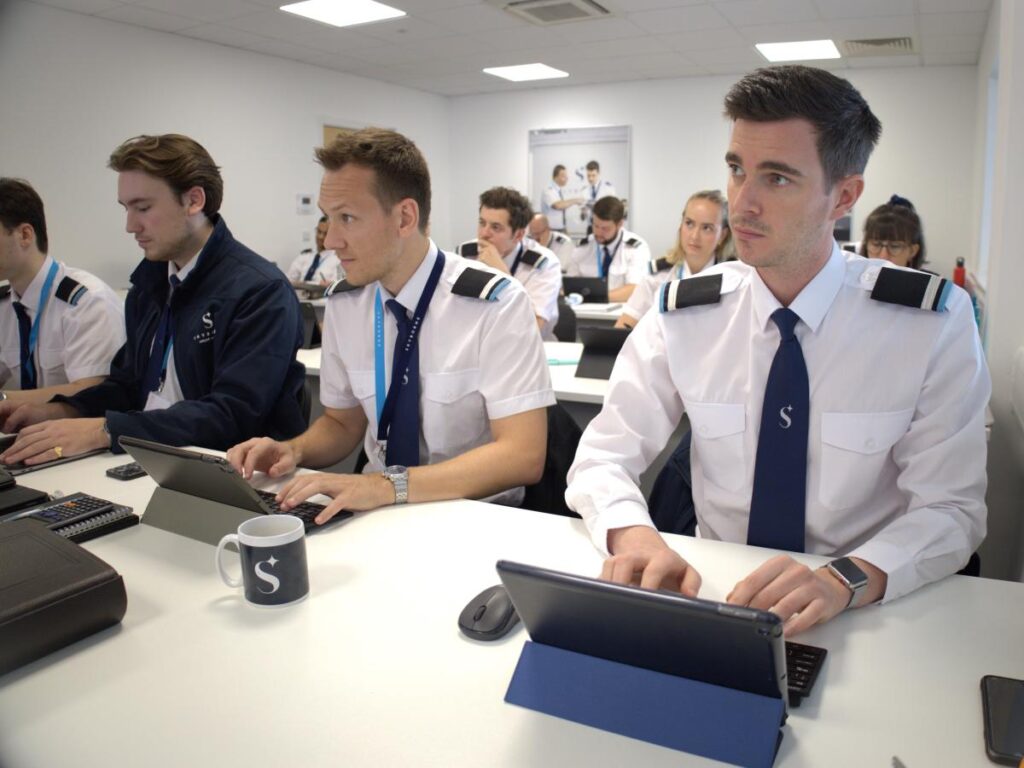Skyborne is a contemporary pilot training academy with campuses located in the UK, Florida, and India, aimed at equipping the next generation of commercial pilots. The institution, founded in 2018 and situated at Gloucestershire Airport in the UK, offers an intensive Airline Transport Pilot Licence (ATPL) course that spans 70 weeks and costs approximately $136,000. The pandemic posed significant challenges for the aviation sector shortly after the UK’s training base was completed in April 2019. Despite these hurdles, Skyborne’s commercial director, Carla Booth, expressed confidence in the industry’s recovery, anticipating a surge in demand for pilots as airlines look to replenish their ranks after extensive layoffs. The academy addresses the ongoing pilot shortage—estimated by Oliver Wyman to be nearly 80,000 globally by 2032—by providing rigorous training as well as partnerships with major airlines such as Delta Air Lines and British Airways.
Skyborne welcomes a steady flow of new cadets, with nine intakes of 20 students each year. The training regimen includes an essential six-month phase in Florida, where UK cadets engage in single-engine flight training. This dual-site structure enhances training diversity and accessibility, catering to both UK and US-based students. The inclusion of the British Airways’ Speedbird Pilot Academy program has also augmented the academy’s stature, allowing up to 200 cadets to have their training costs covered. With reports of around 40,000 applications for this program, Skyborne finds itself at the center of a recruitment surge, executing plans to expand its cadre of qualified pilots in collaboration with interviewing airlines. The demand for new professionals highlights the pressing need for skilled pilots in the wake of the aviation industry’s recovery from the pandemic.
The life of cadets at Skyborne is characterized by strong camaraderie and a supportive learning environment. Upon joining, trainees reside in academy accommodations in Cheltenham, often bonding over social activities organized by previous course intakes. This sense of community is further augmented by the close interactions between cadets, engineers, and air traffic controllers, which fosters collaboration and helps to break down professional barriers. The training atmosphere is inclusive, which is particularly important as the aviation industry has historically been male-dominated. Current figures show that women constitute only 12% of Skyborne’s intake and a mere 5% of global pilots. Cadet Libby Roebuck’s experience reflects the ongoing efforts to encourage more female representation in this field, motivating her to advocate for change and support her peers.
The initial stage of Skyborne’s training is rigorous, focusing on an intensive ground school experience that comprises six months of academic coursework, coupled with customer-service training. Cadets follow a structured schedule, attending classes from early morning until late at night and dedicating additional hours over weekends. The emphasis on customer service reflects a broader awareness within the industry regarding the importance of soft skills in conjunction with technical training. After the academic phase, the cadets transition to Florida for practical flight training, where they master single-engine operations. Once their training is complete in Florida, they return to the UK for advanced multi-engine flight training, progressively acquiring skills needed for handling different aircraft types.
As part of their comprehensive curriculum, Skyborne students undergo a variety of training modules aimed at preparing them for real-world flying situations. This includes training in simulators for multi-engine aircraft such as the Diamond DA42 and specialized courses in Upset Prevention Recovery Training, designed to equip cadets with recovery techniques for critical flight scenarios. The final phase of training encompasses learning to function effectively within multi-pilot crews and utilizing advanced simulators, such as those for the Boeing 737 Max. This structured training is critical in preparing future pilots for operational demands within commercial aviation, ensuring they gain proficiency in handling complex aircraft in high-stakes environments.
The training journey at Skyborne concludes with successful cadets pairing with airlines for their first positions, often after additional aircraft-specific training. Much of the reward for Skyborne staff lies in witnessing the remarkable transformation of cadets throughout their training periods. Graduating students frequently secure jobs with airlines like British Airways, easyJet, and TUI, marking a significant milestone in their aviation careers. Cadet Libby Roebuck’s ambition reflects the aspirations of her peers, as she hopes to interview for a position as a first officer on the Airbus A320 through British Airways’ pathway program. The confluence of intensive training, supportive community, and strategic partnerships with leading airlines positions Skyborne as a leading institution in nurturing the future of aviation professionals.

